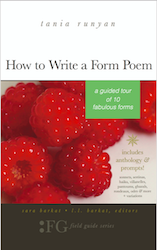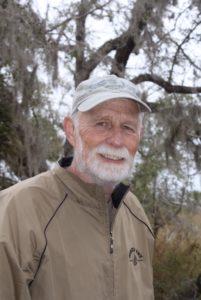Poet-a-Day: Meet Ron Wallace
I first learned about Ron Wallace while reading the anthology Learning By Heart: Contemporary American Poetry About School. I’ve returned to this anthology repeatedly over the past two decades as a poet, teacher, and former awkward student with pigtails who can relate to many of the subjects and voices included in its pages.
One of my favorite poems in the book, “Mrs. Goldwasser,” would bring me to include that poem in Every Day Poems and continue to search out Wallace’s work. Here are the first six lines of his sonnet-ode. Want to read the rest? Find it in Long for This World: New and Selected Poems by Ron Wallace, and, of course, How to Write a Form Poem.
Mrs. Goldwasser (excerpt)
Shimmered like butterscotch; the sun
had nothing on her. She bangled
when she walked. No one
did not love her. She shone,
she glowed, she lit up any room,
her every gesture jewelry…
—Ron Wallace
Here’s what the poet has to share about the poem’s history. I treasure these responses almost as much as the poem!
Tania Runyan (TR): Tell me a little about the origin story of “Mrs. Goldwasser.”
Ron Wallace (RW): Maybe every child loves their third grade teacher. I certainly did! After surviving my second grade teacher, elderly Mrs. Sands, who was as abrasive as her name, and who, for reasons I can’t remember, once pinned a tail on me (ostensibly for being a tattle tale) and made me wear it all day, I was reluctant to return to school for third grade.
But young Mrs. Goldwasser was every bit as wonderful as my poem purports, and certainly worth an ode, even if it is just an ode the size of a sonnet. While Mrs. Sands demonstrated my failures, Mrs. Goldwasser praised my successes. It was in her class that I became a member of “the Good Writers Club” (more for my cursive penmanship than my creative writing); won the school spelling bee (and got, from the rouged and powdered principal, Mrs. Rossie, a big wet kiss that was broadcast over the PA system to every room in the school); read the entire classroom library (including Clara Barton: Girl Nurse; Thomas Alva Edison: Boy Inventor; Little Witch); and asked my seat mate, Allison Bradbury, to marry me (she refused). Fourth grade, with a year-long substitute teacher, would prove again to be dreadful, but third grade was pure Gold. Pure Wasser.
TR: How does this form lend itself to the purpose of memory and praise?
RW: The poem is a mini-ode, an appropriate form in praise of a teacher who was incredibly important and inspiring for me when I was still a small version of who I would one day become. The sonnet form, which has been embraced by nearly every poet over the past 780 years since its invention by Giacomo da Lentino in the court of Frederic II of Sicily in 1230, endures for many reasons: its length (long enough to cover a subject but short enough to carry a punch), its built-in thematic tension between the octave and sestet (or, in this case between the first 12 lines and the last 2), its often song-like rhyme and meter that enhances pleasure and memory. Although this sonnet is traditionally lyrical, I took liberties with the form, flirting with free verse, to give a sense of the freedom I felt personally within Mrs. Goldwasser’s standard 1950s classroom.
The poem is a celebration of her and that freedom; it is also an elegy for her loss—first, simply by my moving on to fourth grade, and then by her death.
TR: What can poets learn from a book like How to Write a Form Poem?
RW: For one thing, by writing (and reading) formal verse you may begin to see that form, while at first seeming mechanical and restrictive, can be a way of connecting with a long literary tradition that can enrich and expand your writing. An individual poem does not exist by itself in a vacuum, but rather it draws on the energy and power of that tradition.
Further, the form itself can help generate a poem. Writing poetry in a traditional form is a cooperative effort. You might say, “OK, sonnet, here’s what I’m going to do with you.” But then the sonnet form says, “Oh, yeah? Well, here’s what I’m going to do with you!” And this playful give-and-take can send you in surprising directions that you never would have been able to discover on your own.
About Ron Wallace:
Ron Wallace founded the Program in Creative Writing at the University of Wisconsin-Madison and directed it for nearly forty years. He is the author of over twenty books and chapbooks of poetry, fiction, and criticism, including Long For This World: New & Selected Poems, and For Dear Life: poems (both from the University of Pittsburgh Press). He is currently Felix Pollak Professor of Poetry Emeritus, and Poetry Editor of the University of Wisconsin Press Poetry Series.
Photo by K. Hurley, Creative Commons, via Flickr. Post by Tania Runyan.
Browse more Poet-a-Day
Browse 50 States of Generosity
Check out The Yellow Wall-paper Graphic Novel
______________
How to Write a Form Poem: A Guided Tour of 10 Fabulous Forms

You’ll also be entertained by Runyan’s own travel stories that she uses to explain and explore the various forms—the effect of which is to bring form poetry down to earth (and onto your own poetry writing map)!
BUY HOW TO WRITE A FORM POEM NOW!
- Flowers of California: California Poppy - December 8, 2022
- Flowers of California: Lily of the Nile - October 13, 2022
- Flowers of California: Crape Myrtle - October 5, 2022


L.L. Barkat says
Oh, I loved his backstory on the poem. So very, very dear. It really shows the power we have to open the lives of children, if we ourselves are open to their hearts and ways.
And this made me laugh! > “But then the sonnet form says, ‘Oh, yeah? Well, here’s what I’m going to do with you!’ “
Tania Runyan says
I loved that, too, L.L.! Everything about Ron’s poem and his explanation of the inspiration and process is delightful!
Bethany R. says
I love that he chose the word “butterscotch” in his simile for this kind teacher. Such an endearing reference. What a wonderful interview and poem.